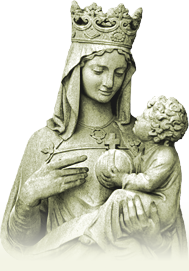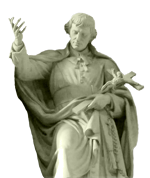Church
Hail to the Pope!
Orlando Fedeli
In times of religious and ecclesiastical crisis - specially when it reaches the highest authorities of the Church - two opposite temptations usually appear.
The first, and more serious one, is of revolt against the Pope's authority, which may lead to schism and heresy.
The second, and subtler one, is to accept in silence all error, by respect of authority, or to close one's eyes to the sins of scandal into which authority might incur.
In the late Middle Ages and in the Renaissance, for example, many Catholics gave in to the first temptation, adhering to countless heretical sects. Luther and the Reformation - so praised nowadays - took this revolt to its peak, by attacking the papacy itself, under the pretext that there was corruption in Rome, and many popes were known then for their scandalous lives. Heretics mistook the person who was on Peter's throne with the papacy in itself.
So many were the undeniable scandals of some popes of those days, that among the most important theologians it was once again studied the possibility of a Pope to fall in heresy while as a private person, though never as a Pope performing his ministry "ex-cathedra". Saint Robert Bellarmine, the great Doctor of the Church who lived then, was one of those theologians.
The First Vatican Council - which took place in 1870 - proclaimed the dogma of papal infallibility, establishing that whenever a Pope teaches the whole Church "ex-cathedra", that is, as the Vicar of Christ, with the power given by Our Lord to Saint Peter, on matters of Faith or Morals, with the explicit intention to define a doctrine and condemning the opposite statement, the Pope is infallible.
This dogma of the Pope's infallibility - to which we adhere to the deepest of our souls - is the guarantee that the Church will never err. Our Lord Jesus Christ Himself, by giving Peter the keys, told him: "Thou art Peter, and upon this rock I will build my Church, and the gates of hell shall not prevail against it. And I will give to thee the keys of the kingdom of heaven. And whatsoever thou shalt bind upon earth, it shall be bound also in heaven: and whatsoever thou shalt loose upon earth, it shall be loosed also in heaven." (Mt. XVI, 18-19).
It's upon these most holy words of Our Lord that the Church based itself to proclaim papal infallibility. That is the foundation of the devotion that every Catholic must have for the Pope, whoever he is.
The enemies of the Church have always wanted to create confusion regarding this point, either by attributing to the Pope as such, and the Church, the sins in which a Pope might fall as a private person, or by extending infallibility to every action of the Supreme Pontiff.
The Pope is infallible as the supreme head of the Church, when speaking "ex-cathedra", but that doesn't make him personaly impeccable. By wanting to confuse infallibillity with impeccability, the enemies of the Holy See seek to undermine the devotion and faith that one must have in the pontifical infallibility.
By meaning to extend infallibility to every action, speech or position of the Pope, the faithful are misled to fall in an error that will put them in serious temptation, when it becomes clear to them that the Pope - as a private person - has erred or sinned.
One must neither reject the infallibility of the Supreme Pontiff because of his possible personal errors or sins, nor deny his possible moral faults because of the brilliance of the infallible charisma of Peter's successor. Regarding the Supreme Pontiff, therefore, one must always have in mind that he remains infallible as Pope, even when he's a sinner; and that he remains a possibly sinful and fallible man, even being an infallible Pontiff when he speaks "ex-cathedra".
To illustrate what we have said, it's convenient to recall how Saint John Bosco behaved in the beginning of Pius IX's pontificate.
As it is well known, the Pope of the unmatched Syllabus, the Pope of the Immaculate Conception, the Pope who proclaimed the dogma of pontifical infallibility took measures in the beginning of his pontificate which favoured much the liberals. He conceded amnesty to the terrorists and carbonari arrested in all the Church's States, he gave these states a liberal constitution, he named a liberal prime-minister; in short, he helped so much the revolutionaires that Rome became the refuge of anarquists, carbonari and revolutionaires of all ranges and types. That's why Masonry made people shout in Italian streets and all over the world: "Hail to Pius IX!".
Saint John Bosco, who lived in Turin by then, ordered his students to never shout "Hail to Pius IX", but rather "Hail to the Pope!". By doing this, Don Bosco undid the carbonari maneuver. We must always shout "Hail to the Pope", regardless of the name of he who is on Peter's throne. Whether he is a saint or a sinner, we must always keep towards the Pope - "sweet Christ on earth", as Saint Catherine of Siena has said - our filial devotion and our fidelity to everything he teaches as legitimate successor of Peter and with the power of the keys.
Nowadays the comprehension of these principles is even more needed, for we are threatened by two opposite errors regarding the Pope: sede-vacantism and universal infallibility.
We reject both.
There are those who state that the last popes, due to their adhesion to the errors of Vatican II - a merely pastoral and non-dogmatic Council, thus fallible, and which, because of this, no one is compelled to accept - have lost their pontificate. It's a reckless, adventurous and rash thesis, since to this day no one has demonstrated it with clear and irrefutable proof. This thesis places the faithful in the brink of schism, if not inside it.
On the other hand, modernists and progressists, who saw their erroneous ideas triumph in Vatican II, seek to force upon the Catholic faithful these errors of the last Council, as if they were dogmas of Faith, which is absolutely false.
Even more, the defenders of universal and absolute infallibility of the Pope seek to drive Catholics to judge any speech from the Pope - even a simple speech of greetings to tourists - as if it were a dogma of Faith, levelling a pastoral text, or a speech of courtesy, with "ex-cathedra" pronouncements. This we cannot accept either.
The Pope, it's never enough to repeat, is only infallible when he teaches "ex-cathedra". Apart from that, he may err. So, it is legitimate to reject the errors of Vatican II and everything that has been done based on them, in so far as they oppose the teachings of all the previous popes.
For example, the famous journey of prayers for peace, carried out in Assisi by John Paul II, in 1986, frontally opposed everything that the Church has always taught when, in reiterated pronouncements of popes, She condemned interconfessionalism and indifferentism. Such a journey is unacceptable.
To have devotion for the Pope is the duty of every Catholic. But the reigning Pope himself must be devoted to the Papacy.
Also John Paul II is obliged to accept what popes prior to him have taught "ex-cathedra".
It is, therefore, with true Catholic devotion to Peter's Chair that we exclaim with all our souls: "Hail to the Pope!", whoever he is.
Once, Christ asked the apostles: "Who do men say that I am?". The apostles answered: "Some say that thou art Elias, others say that thou art John the Baptist who has returned". And Christ asked: "But whom do you say that I am?". They remained silent, not knowing what to say.
They didn't know what to say, after seeing so many miracles. They didn't know what to say, after listening to so many truths.
Until Saint Peter proclaimed: "Thou art the Christ, the Son of the living God!"
Today, God asks us: who do men say that the Pope is? And some answer that he is a common man, while others - heretics - slander him, saying he is the antichrist.
And us, who do we say that the Pope is?
He is Peter reborn. He is actually, wholly, "the sweet Christ on earth". With Saint Catherine of Siena we repeat this affirmation so sweet to our heart of Catholics, so filled with truth, with this Truth that since baptism is the light of our souls and our lives.
Yes, we are sure. We Catholics are the children of certainty. And with the certainty that the word of Christ and the dogma of papal infallibility give us, firm on the rock we say with all the strength in our souls: the Pope is Peter reigning in Rome. The Pope is the vicar of Christ. And when this cursed century questions us with its atheistical mouth or with its progressist tongue; when it doubts our faith with an ironic smile; when it threatens us and interrogates us, saying: "And who is the Pope?", with pride we answer that he is our Father in the Faith.
After centuries of sanctity generated by the Church and Her doctrine, infallibly repeated by the popes of all times; after two thousand years of miracles, how can one not know how to answer this question which the world today addresses us with insolence: "And who is the Pope?"? The Pope is the Rock on which Our Lord has built His Church.
And when this subjectivist and evolutionist century, which makes an infallible "pope" out of every pseudo-scientist, or guru, repels the popes of the past because it thinks that everything evolves, we answer that heaven and earth shall pass away, but the Pope's words speaking "ex-cathedra" shall never pass away.
A poet once said that it's easy to believe in the light at midday. It is hard to believe in the midnight sun.
It was easy to believe and be truly devoted to the Pope, when Saint Gregory VII, Pius IX or Saint Pius X reigned in Rome. It was hard to keep true fidelity and true devotion to the Pope in Avignon, or in the days of the Great Western Schism, or in the court of Renaissance Rome.
It is harder still to keep fidelity to the Church and true devotion to the Pope in these days of darkness, during the eclipse of the Catholic sun, caused by Vatican II.
It is thus amid the modernist darkness of Vatican II, hated and misunderstood by those who err on the left, and even on the right, that we proclaim with Faith: We believe in One, Catholic, Apostolic and Roman Church. We believe in the Pope! Hail to the Pope! Hail to the Pope, sweet, sweet Christ on earth.
Para citar este texto:
"Hail to the Pope!"
MONTFORT Associação Cultural
http://www.montfort.org.br/eng/veritas/igreja/vivaopapa/
Online, 27/04/2025 às 16:25:30h








